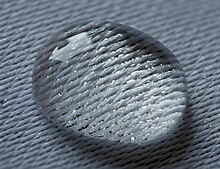User:PedB03/Aquaphobia

Aquaphobia (from Latin aqua 'water', and Ancient Greek φόβος (phóbos) 'fear') is an irrational fear of water.[1]
Aquaphobia is considered a Specific Phobia of natural environment type in the Diagnostic and Statistical Manual of Mental Disorders. A specific phobia is an intense fear of something that poses little or no actual danger.[2]
| This is the sandbox page where you will draft your initial Wikipedia contribution.
If you're starting a new article, you can develop it here until it's ready to go live. If you're working on improvements to an existing article, copy only one section at a time of the article to this sandbox to work on, and be sure to use an edit summary linking to the article you copied from. Do not copy over the entire article. You can find additional instructions here. Remember to save your work regularly using the "Publish page" button. (It just means 'save'; it will still be in the sandbox.) You can add bold formatting to your additions to differentiate them from existing content. |
Article Evaluation[edit]
This article has very little information on the topic of choice, aquaphobia. The information provided gives insight on prevalence in the U.S., the manifestation of the phobia and the etymology of the word. Reading from the outside there is no claim to be made and it does not support nor discredit any form of information, making it neutral. I do believe it is very lacking on information but everything that is provided is backed by sources. I think that this article does address a small good size proportion of the population because it is a pretty under the radar type of phobia. By this I mean a lot of people know about the concept but can not put or fail to put words to it. I think an article like this can be further developed and looked into.
Etiology and Manifestation[edit]
The word aquaphobia stems from the latin word 'aqua' meaning water and the greek word 'phobos' meaning fear or horror. The two parts together are how we are able to define aquaphobia as an irrational fear of water.[3]
There are five common causes of aquaphobia: instinctive fear of drowning, experienced an incident of personal horror, has an overprotective parent/parent with aquaphobia, psychological difficulty adjusting to water and lack of trust in water. [4] Psychologists indicate that aquaphobia manifests itself in people through a combination of experiential and genetic factors.[5]
Prevalence[edit]
In America, 46% of American adults are afraid of deep water in pools and the other 64% are afraid of deep open waters.[4] According to Lindal and Stefansson aquaphobia may affect as many as 1.8% of the general Icelandic population, or almost one in fifty people.[6]
Signs and Symptoms[edit]
Physical responses include nausea, dizziness, numbness, shortness of breath, increased heart rate, sweating and shivering.[4]
In addition the signs and symptoms above, some general signs and symptoms one may display in reaction to a specific phobia may include:
- Physical Symptoms: trembling, hot flushes or chills, pain or tightness in chest, butterflies in stomach, feeling faint, dry mouth, ringing in ears, confusion
- Psychological Symptoms: feeling fear of losing control, fainting, dread and dying. [7]
Treatment[edit]
Bibliography[edit]
[8] Misimi, F., Kajtna, T., Misimi, S., & Kapus, J. (2020). Development and Validity of the Fear of Water Assessment Questionnaire. Frontiers in Psychology,11. doi:10.3389/fpsyg.2020.00969
[4] Aboo Bakar, R., & Aboo Bakar, J. (2017). Aquaphobia: Causes, Symptoms and Ways of Overcoming It for Future Well-being. International Academic Research Journal of Social Science,3(1), 82-88.
[9] Mehta, N., & Espinel, Z. (2021). Aquaphobia: A Case Report on the Unique Presentation of a Specific Phobia. The American Journal of Geriatric Psychiatry,29(4). doi:10.1016/j.jagp.2021.01.139
[10] Depiano, F. (1985). Hypnosis in the Treatment of Aquaphobia. Psychotherapy in Private Practice,3(1), 93-97. doi:10.1300/j294v03n01_11
[11] Tembekar, S., Modak, R., & Patil, S. P. (n.d.). Tackling aquaphobia using Virtual Reality. International Journal of Advance Research, Ideas and Innovations in Technology,5(3), 693-695.
- ^ Dorland's Illustrated Medical Dictionary. Elsevier. 2011. p. 122.
- ^ "Anxiety disorders". Office on Women's Health. US Department of Health and Human Services. Retrieved 20 November 2019.
 This article incorporates text from this source, which is in the public domain.
This article incorporates text from this source, which is in the public domain.
- ^ Davis, Charles. "Medical Definition of Aquaphobia".
{{cite web}}: CS1 maint: url-status (link) - ^ a b c d Aboo Bakar, Rofiza. "Aquaphobia: Causes, Symptoms and Ways of Overcoming It for Future Well-being" (PDF).
{{cite web}}: CS1 maint: url-status (link) - ^ Lynne L. Hall, Fighting Phobias, the Things That Go Bump in the Mind, FDA Consumer Magazine, Volume 31 No. 2, March 1997
- ^ Líndal, E.; Stefánsson, J. G. (1993). "The lifetime prevalence of anxiety disorders in Iceland as estimated by the US National Institute of Mental Health Diagnostic Interview Schedule". Acta Psychiatrica Scandinavica. 88 (1): 29–34. doi:10.1111/j.1600-0447.1993.tb03410.x. ISSN 0001-690X. PMID 8372693. S2CID 42323599.
- ^ National Health Service. "Symptoms - Phobias".
{{cite web}}: CS1 maint: url-status (link) - ^ Misimi, Fatmir; Kajtna, Tanja; Misimi, Samir; Kapus, Jernej (2020-05-29). "Development and Validity of the Fear of Water Assessment Questionnaire". Frontiers in Psychology. 11: 969. doi:10.3389/fpsyg.2020.00969. ISSN 1664-1078. PMC 7274019. PMID 32547447.
{{cite journal}}: CS1 maint: PMC format (link) CS1 maint: unflagged free DOI (link) - ^ "Aquaphobia: A Case Report on the Unique Presentation of a Specific Phobia". The American Journal of Geriatric Psychiatry. 29 (4): S140. 2021-04-01. doi:10.1016/j.jagp.2021.01.139. ISSN 1064-7481.
- ^ PhD, Frank DePiano (1985-02-28). "Hypnosis in the Treatment of Aquaphobia". Psychotherapy in Private Practice. 3 (1): 93–97. doi:10.1300/J294v03n01_11. ISSN 0731-7158.
- ^ Tembekar, Sanket. "Tackling aquaphobia using Virtual Reality" (PDF).
{{cite web}}: CS1 maint: url-status (link)
